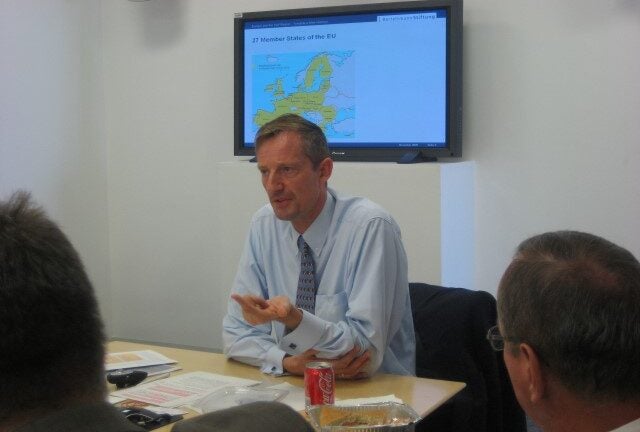Dialogue Series, Regional Studies
Europe and the Gulf Region: Towards a New Horizon

Christian-Peter Hanelt, Senior Expert on Europe and the Middle East at the Bertelsmann Stiftung, was invited by CIRS to give a lunchtime Focused Discussion entitled “Europe and the Gulf Region: Towards a New Horizon” to Georgetown University–Qatar faculty and staff on November 4, 2009.
Hanelt focused on the current relations between Europe and the Gulf region. He maintained that the GCC was an important political partner, energy supplier, and, in its efforts to diversify, a crucial investor in the European Union. “The EU and the Gulf,” he said, “are islands of stability” that are surrounded by economic and politic turbulence.
Advocating for the importance of strengthening ties within the European Union, Hanelt noted that those countries that are party to the Euro currency were significantly less affected by the recent global economic crisis than those that maintained their own currencies. The current reforms proposed by the Lisbon Treaty, Hanelt said, will undoubtedly affect the ways in which the European Union is structured, its future expansion, and its relationships with its neighbors as well as with the larger international community. Issues of European Union expansion to include Turkey are of particular significance in the years to come and will have direct consequences on its relationships with the Middle East and the Gulf.
Currently, the EU works with Middle East and North Africa (MENA) countries in various state-building and soft power initiatives and Qatar’s prolific conflict resolution plans, he said, are of particular importance to its rapport with the European Union.
In terms of possible future collaborative projects between the EU and the Gulf, Hanelt predicted that the most important areas of synergy will be on issues of sustainability and the setting up of mutually beneficial agricultural, solar, and energy plans. Hanelt said that “both the GCC and the EU depend on functioning global markets and there is a need for more cooperation and dialogue on how to work together in the G20.”
In looking at the future of EU-GCC relations, Hanelt suggested that the EU and the GCC could collaborate on a variety of free trade agreements such as those that have been negotiated between the GCC and the United States. Other areas of accord could involve higher education initiatives, research, and dialogue on issues of regional security challenges.
Article by Suzi Mirgani, CIRS Publications Coordinator.